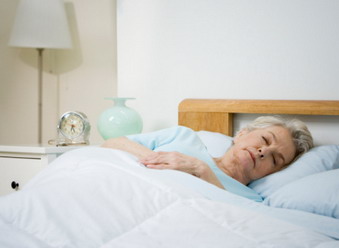人的正常睡眠可以分为快波睡眠和慢波睡眠,其中慢波睡眠是人体得到最充分休息的睡眠阶段,也称深度睡眠,其长短被认为是睡眠质量高低的决定因素。美国研究人员的一项最新研究显示,对老年人而言,如果慢波睡眠的时间不足,患高血压的风险也将大大提高。

美国哈佛大学医学院和布里格姆妇科医院等机构的研究人员分析了784名年龄在65岁以上男性的数据,这些老人在2003年至2005年间参与了名为“老年男性睡眠障碍研究结果”的项目。这批男性在研究开始时均没有患高血压,但大约3年后,高血压患者已达243名。
研究人员根据这批人慢波睡眠的时间从低到高划分为四个组。考虑了年龄、体重指数及其他因素后,研究人员发现,慢波睡眠阶段的减少与患高血压风险的提高具有特定关联,但二者并不具有因果关系。慢波睡眠不足睡眠总量4%的老年人患高血压的风险会提高80%;慢波睡眠较少的老年人睡眠持续时间通常也较短,夜间长时间处于清醒状态,更可能出现睡眠障碍。
这项研究成果已发表在美国心脏病协会出版的《高血压》(hypertension )杂志网络版上。参与研究的哈佛大学医学院教授苏珊•雷德兰指出,慢波睡眠通常随着年龄的增长而减少,儿童慢波睡眠的时间可达睡眠长度的40%,健康成年人仅有25%,而参与研究的老年人平均只有11.2%。
生物探索推荐英文论文摘要:
Decreased Slow Wave Sleep Increases Risk of Developing Hypertension in Elderly Men
The importance of sleep to health and cardiovascular disease has become increasingly apparent. Sleep-disordered breathing, sleep duration, and sleep architecture may all influence metabolism and neurohormonal systems, yet no previous study has evaluated these sleep characteristics concurrently in relation to incident hypertension. Our objective was to determine whether incident hypertension is associated with polysomnography measures of sleep-disordered breathing, sleep duration, and sleep architecture in older men. Participants were 784 community-dwelling, ambulatory men ≥65 years of age (mean age: 75.1±4.9 years) from the Outcomes of Sleep Disorders in Older Men Study who did not have hypertension at the time of their in-home polysomnography sleep studies (2003–2005) and who returned for follow-up (2007–2009). Of 784 older men included in this report, 243 met criteria for incident hypertension after a mean follow-up of 3.4 years. In unadjusted analyses, incident hypertension was associated with increased hypoxemia, increased sleep stages N1 and N2, and decreased stage N3 (slow wave sleep [SWS]). After adjustment for age, nonwhite race, study site, and body mass index, the only sleep index to remain significantly associated with incident hypertension was SWS percentage (odds ratio for lowest to highest quartile of SWS: 1.83 [95% CI: 1.18 to 2.85]). No attenuation of this association was seen after accounting for sleep duration, sleep fragmentation, and indices of sleep-disordered breathing. Percentage time in SWS was inversely associated with incident hypertension, independent of sleep duration and fragmentation, and sleep-disordered breathing. Selective deprivation of SWS may contribute to adverse blood pressure in older men.







